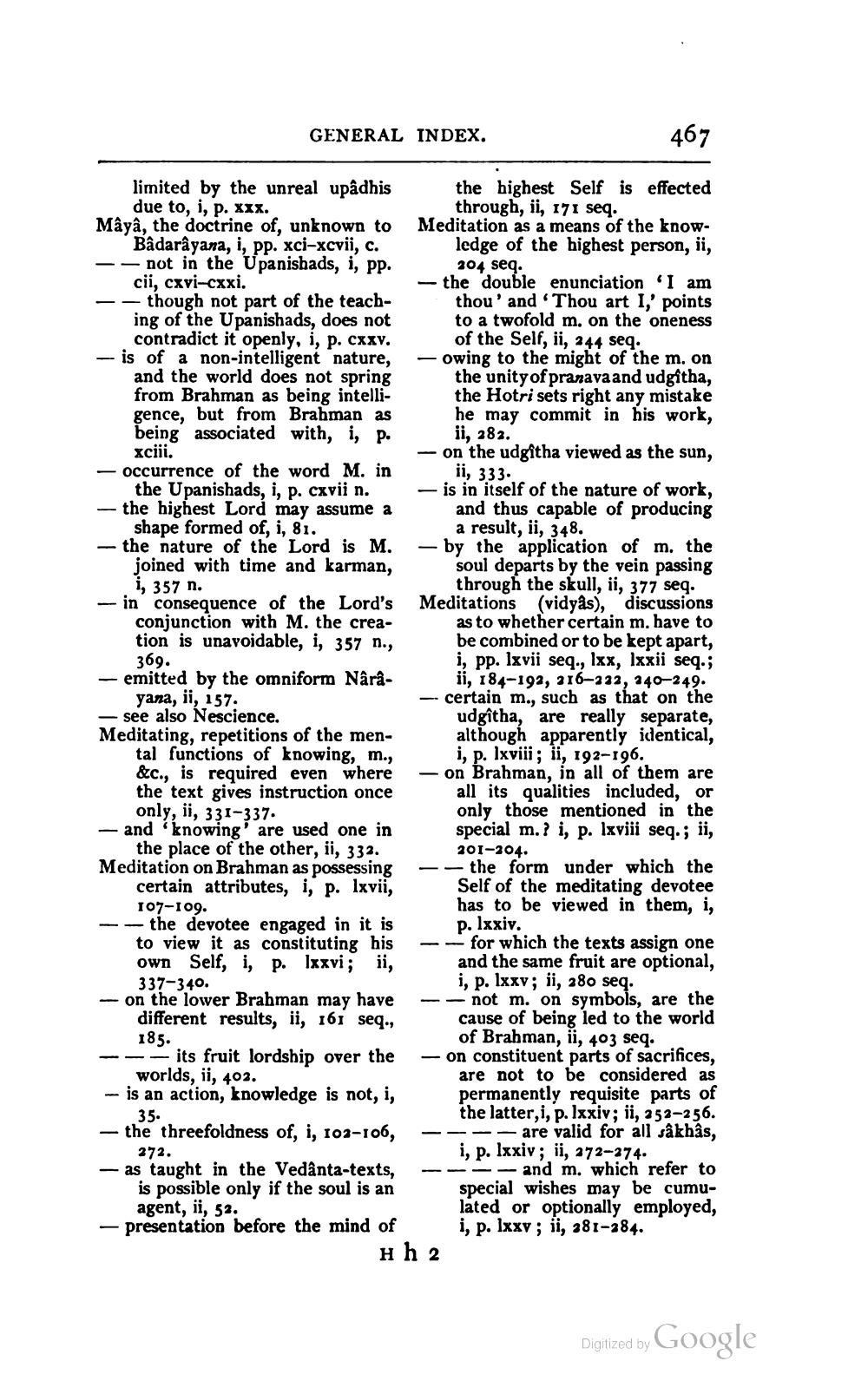________________
GENERAL INDEX.
467
Máyā, tharayana, Upanisha
369.
limited by the unreal upâdhis the highest Self is effected due to, i, p. XXX.
through, ii, 171 seq. Mâyâ, the doctrine of, unknown to Meditation as a means of the know
Bâdarayana, i, pp. xci-xcvii, c. ledge of the highest person, ii, -- not in the Upanishads, i, pp. 304 seg. cii, cxvi-cxxi.
- the double enunciation 'I am – though not part of the teach- thou' and 'Thou art 1,' points ing of the Upanishads, does not to a twofold m. on the oneness
contradict it openly, i, p. cxxv. of the Self, ii, 244 seq. -- is of a non-intelligent nature, owing to the might of the m. on
and the world does not spring the unity of pranavaand udgîtha, from Brahman as being intelli- the Hotri sets right any mistake gence, but from Brahman as he may commit in his work, being associated with, i, p. ii, 282. xciii.
- on the udgitha viewed as the sun, — occurrence of the word M. in ii, 333.
the Upanishads, i, p. cxvii n. - is in itself of the nature of work, - the highest Lord may assume a and thus capable of producing shape formed of, i, 81.
a result, ii, 348. - the nature of the Lord is M. - by the application of m. the
joined with time and karman, soul departs by the vein passing i, 357 n.
through the skull, ii, 377 seq. - in consequence of the Lord's Meditations (vidyas), discussions conjunction with M. the crea
as to whether certain m. have to tion is unavoidable, i, 357 n., be combined or to be kept apart,
i, pp. Ixvii seq., Ixx, lxxii seq.; - emitted by the omniform Nara- ii, 184–192, 216–232, 340–249. yana, ii, 157.
- certain m., such as that on the - see also Nescience.
udgîtha, are really separate, Meditating, repetitions of the men- although apparently identical,
tal functions of knowing, m., i, p. Ixviii; ii, 192-196. &c., is required even where on Brahman, in all of them are the text gives instruction once all its qualities included, or only, ii, 331-337.
only those mentioned in the - and 'knowing' are used one in special m.? i, p. Ixviii seq.; ii, the place of the other, ii, 332.
201-204. Meditation on Brahman as possessing - the form under which the
certain attributes, i, p. lxvii, Self of the meditating devotee 107-109.
has to be viewed in them, i, -- the devotee engaged in it is p. lxxiv.
to view it as constituting his --for which the texts assign one own Self, i, p. lxxvi; ii, and the same fruit are optional, 337-340.
i, p. lxxv; ii, 280 seq. on the lower Brahman may have - - not m. on symbols, are the different results, ii, 161 seq.,
cause of being led to the world 185.
of Brahman, ii, 403 seq. -- its fruit lordship over the - on constituent parts of sacrifices, worlds, ii, 402.
are not to be considered as - is an action, knowledge is not, i, permanently requisite parts of
the latter,i, p. Ixxiv; ii, 253–256. - the threefoldness of, i, 103-106, -- -- are valid for all sâkhâs, 272.
i, p. lxxiv; ii, 272-274. as taught in the Vedânta-texts, --- and m. which refer to
is possible only if the soul is an special wishes may be cumuagent, ii, 52.
lated or optionally employed, - presentation before the mind of i, p. lxxv; ii, 281-284.
H h 2
6
35.
Digized by Google




